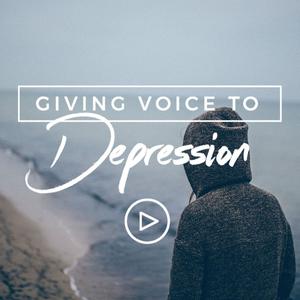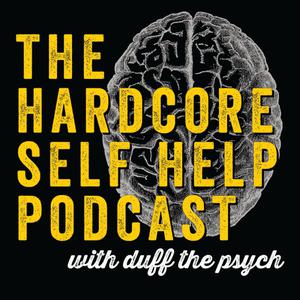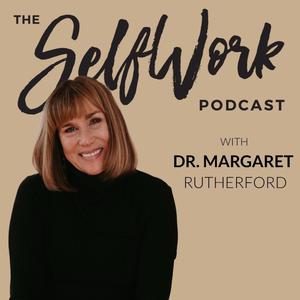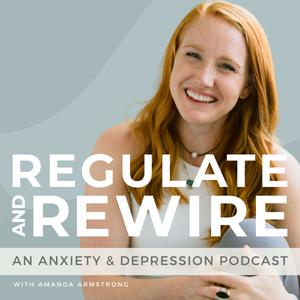
Giving Voice to Depression
Giving Voice to Depression
Depression affects more than 375,000,000 worldwide. So basically, if you don't have it yourself, you know someone who does. Giving Voice to Depression was founded to start discussions that reduce stigma and promote understanding. We look at depression from many angles. A journalist with depression pre-produces short interview segments, and then she and cohost/licensed therapist Dr. Anita Sanz comment on the issues presented. The episodes are informative and hopeful-- and seldom depressing. It's time to shine some light on depression's darkness! Join us.
- 22 minutes 22 secondsEp. 344: "Understanding a Family Tragedy"
We'd love to hear your feedback!
In this deeply-moving episode of Giving Voice to Depression, Chris Coulter shares the heartbreaking story of losing his 14-year-old daughter Maddie to suicide and the profound journey of understanding and healing that followed.
Chris opens up about Maddie’s vibrant, kind spirit, her struggles with depression, and the challenges of recognizing and supporting a loved one in pain.Chris also reflects on his own battle with depression, which intensified after Maddie’s passing, giving him a painful but invaluable insight into what she might have felt. He candidly shares about the darkest periods of his life, his despairing thoughts, and how he found the strength to carry on for his family.
Through his raw honesty, Chris shines a light on the importance of persistent support, open conversations, and recognizing the signs of depression.
This episode is both heart-wrenching and inspiring, reminding us of the life-saving impact of checking in with those we love—even when it feels like they’re pushing us away.Tune in to hear Chris’s powerful story and learn practical advice from co-hosts Terry McGuire and Dr. Anita Sanz on how to support someone battling depression.
This episode is a must-listen for anyone seeking to better understand mental health and the strength it takes to navigate life’s toughest challenges.
Chris Coulter's website/resources:
https://www.thefinishlinegroup.com/wake-up-resource-guide
Simon Sinek's "Do You Have 8 Minutes?" video:
https://www.youtube.com/watch?v=2lH6x5zn0GIhttps://recovery.com/
https://givingvoicetodepression.com/
Facebook Community: https://www.facebook.com/GivingVoiceToDepression/
X (formerly Twitter): https://x.com/VoiceDepression
Dr. Anita Sanz's LinkedIn: https://www.linkedin.com/in/dr-anita-sanz-746b8223/
Terry's LinkedIn: https://www.linkedin.com/in/givingvoicetodepression/28 January 2025, 9:00 am - 25 minutes 59 seconds343_It's Hard to Fix Something Broken With Something Broken (Remix)
We'd love to hear your feedback!
In this deeply-relatable episode, Davey shares his journey of living with and managing major depressive disorder and social anxiety. Having reached out after finding solace hearing about previous guests' journeys, Davey hopes his story resonates with listeners who feel isolated by their struggles.
Davey recounts the physical and emotional toll depression took on him, leading to a pivotal moment in 2017 when he sought help after being utterly exhausted and unable to continue. With the support of compassionate doctors and therapists, he began learning how to confront his "enemy"—a term he uses to describe depression—through research, reflection, and trial-and-error with coping mechanisms.
One of the most striking metaphors in the episode comes from Davey's hobby of restoring vintage chainsaws. He describes how clogged components in a chainsaw mirror the mental buildup caused by depression, a vivid image that underscores the importance of addressing internal issues to regain functionality.
Davey also emphasizes the importance of "tools for time"—strategies that help him manage his condition moment by moment. These include hobbies like playing the guitar and restoring chainsaws, which provide small yet meaningful dopamine boosts and distractions from the darkness.
Throughout the episode, Davey reflects on the unhelpful advice well-meaning people often give, comparing it to offering chicken soup to someone recovering from the flu—kind intentions that cannot be digested in the moment. He highlights the value of compassionate listening and understanding over unsolicited advice.
As the episode concludes, Davey shares a message of cautious hope: while depression might not completely disappear, it is possible to live with it, build coping strategies, and find purpose through resilience and connection.
This remix of Davey’s story serves as a reminder that even when life feels broken, there is strength in seeking help, learning, and sharing one's experiences.
https://recovery.com/
https://givingvoicetodepression.com/
Facebook Community: https://www.facebook.com/GivingVoiceToDepression/
X (formerly Twitter): https://x.com/VoiceDepression
Dr. Anita Sanz's LinkedIn: https://www.linkedin.com/in/dr-anita-sanz-746b8223/
Terry's LinkedIn: https://www.linkedin.com/in/givingvoicetodepression/21 January 2025, 9:00 am - 21 minutes 5 secondsNEW_342-A Holistic Approach to Depression
We'd love to hear your feedback!
When depression hit hard, Rena turned inward, exploring yoga, meditation, breathwork, art, and other practices to navigate her healing journey. In this inspiring episode, she shares how she reframed depression as one of many human emotions, and committed to building a relationship with it instead of resisting it.
From the weight of depression's dark, repetitive thoughts to the empowering tools that helped her process them, Rena’s story is a raw and relatable exploration of what it means to manage depression holistically. She reminds us that while healing is deeply personal, it can also be an invitation to go inward and grow.
Discover how embracing depression and moving at its pace can create space for transformation. Whether you’re seeking tools or perspective, this episode is a must-listen for anyone navigating their own mental health journey.
Rena's website: https://www.renashoshana.com/
https://recovery.com/
https://givingvoicetodepression.com/
Facebook Community: https://www.facebook.com/GivingVoiceToDepression/
X (formerly Twitter): https://x.com/VoiceDepression
Dr. Anita Sanz's LinkedIn: https://www.linkedin.com/in/dr-anita-sanz-746b8223/
Terry's LinkedIn: https://www.linkedin.com/in/givingvoicetodepression/14 January 2025, 9:00 am - 20 minutes 50 seconds341_Straight Talk about Mental Health and Addictions (re-broadcast)
We'd love to hear your feedback!
In the episode titled "Straight Talk about Mental Health and Addictions," we engage in a candid discussion with Zane Thomas, a rapper and comedian known for his openness about his mental health challenges, including depression and bipolar disorder.
Zane shares personal experiences, emphasizing the importance of addressing suicidal thoughts and addiction without shame. He encourages listeners to challenge negative self-talk and to view these thoughts as external bullies.The conversation highlights the therapeutic power of humor and connection, illustrating how Zane uses laughter to cope with his struggles. He discusses his journey through substance use, acknowledging the complexity of managing addiction alongside mental health issues. Zane stresses the significance of reaching out for support, offering practical advice, like asking others what they're excited for, to foster hope and connection.
Throughout the episode, the hosts aim to destigmatize discussions around mental health and addiction, fostering an environment where sharing these experiences feels safe. They emphasize that recovery is possible and encourage listeners to keep trying, reinforcing that they are not alone in their struggles.
https://www.instagram.com/zanetherapper/https://recovery.com/
https://givingvoicetodepression.com/
Facebook Community: https://www.facebook.com/GivingVoiceToDepression/
X (formerly Twitter): https://x.com/VoiceDepression
Dr. Anita Sanz's LinkedIn: https://www.linkedin.com/in/dr-anita-sanz-746b8223/
Terry's LinkedIn: https://www.linkedin.com/in/givingvoicetodepression/7 January 2025, 11:00 am - 24 minutes 11 seconds340_Protecting Our Mental Health in Uncertain Times
We'd love to hear your feedback!
In this New Year podcast episode , "Protecting Our Mental Health in Uncertain Times," cohosts Dr. Anita Sanz and Terry discuss strategies for protecting mental health as we enter 2025. They acknowledge that while some people feel optimistic about the New Year, others experience stress, pressure, and overwhelming expectations. The episode focuses on simple, practical tips for well-being that don't require spending money or drastic changes, emphasizing small shifts that can yield big results over time.
Key recommendations include:
- Scheduled Breaks: Anita encourages taking a 15-minute break daily to reset the brain, especially with the overwhelming influx of information we process daily. These breaks can reduce stress and improve productivity.
- Disconnecting from Media: Regularly unplugging from media and practicing mindfulness or spending time in nature can help reduce mental strain and promote relaxation.
- Building Meaningful Connections: Whether through in-person or virtual communities, showing up consistently at the same place or time can foster a sense of belonging, reducing isolation and supporting mental health.
- Seeking Help Early: The hosts stress the importance of seeking support before mental health struggles become overwhelming. Recognizing discomfort and addressing it early can prevent more severe issues.
Throughout the episode, the hosts encourage listeners to embrace manageable, realistic practices that can improve mental health without the pressure of traditional New Year’s resolutions.
https://recovery.com/
https://givingvoicetodepression.com/
Facebook Community: https://www.facebook.com/GivingVoiceToDepression/
X (formerly Twitter): https://x.com/VoiceDepression
Dr. Anita Sanz's LinkedIn: https://www.linkedin.com/in/dr-anita-sanz-746b8223/
Terry's LinkedIn: https://www.linkedin.com/in/givingvoicetodepression/31 December 2024, 9:00 am - 6 minutes 20 seconds339_Annual Tradition_For Those Who Struggle This Christmas
We'd love to hear your feedback!
This special annual episode is produced for those of you who are finding "celebrating" really difficult (impossible?) this holiday season-- for any number of reasons, including grief, addictions, loneliness and mental health conditions.
The 6-minute episode features a reading by John Pavlovitz titled: "To Those Who Struggle This Christmas."
The sincere, supportive message is dedicated specifically to those who find the holiday season difficult due to personal struggles such as grief, loss, depression, or loneliness.
The essay acknowledges the pain and hardships that many experience during the holidays, offering a message of solidarity and encouragement. Pavlovitz reminds listeners that they are not alone in their struggles and that the pain they feel now is not the end of their story.
He reassures them that though the holiday may feel bleak, there will be brighter days ahead. The episode encourages listeners to embrace their feelings without guilt and reminds them of the love and support that exists, even in times of sorrow.
The hosts. Dr. Anita Sanz and Terry, also offer support through their Giving Voice to Depression Facebook community as a resource for those seeking understanding and connection.
Link to John's essay:
https://johnpavlovitz.com/2017/12/24/to-those-who-struggle-this-christmas/https://recovery.com/
https://givingvoicetodepression.com/
Facebook Community: https://www.facebook.com/GivingVoiceToDepression/
X (formerly Twitter): https://x.com/VoiceDepression
Dr. Anita Sanz's LinkedIn: https://www.linkedin.com/in/dr-anita-sanz-746b8223/
Terry's LinkedIn: https://www.linkedin.com/in/givingvoicetodepression/23 December 2024, 3:00 pm - 28 minutes 10 seconds338_ Strategies for Those Grieving During the Holidays (Rebroadcast)
We'd love to hear your feedback!
Strategies for Those Grieving During the Holidays offers suggestions and insights for all coping with loss, not only from the death of loved ones but also from unfulfilled dreams, health challenges, missed opportunities, etc.
Guest Krista St-Germain, a grief expert, highlights the differences between depression (a broader, general sadness) and grief (which is more specific to the loss itself). She emphasizes that grief can stem from any perceived loss, not just death, and suggests that holidays, often associated with idealized family gatherings, can amplify these feelings when someone is missing or things have changed.Krista encourages listeners to communicate their needs clearly during the holiday season. If someone is grieving, they may not want the typical festive activities, but they should be able to express their preferences—whether they need solitude or companionship. The episode also touches on the importance of setting boundaries, even if it disappoints others.
Krista introduces a technique called "NOW" (Name, Open, Witness) to help process emotions by naming them, opening up to them, and witnessing their physical sensations, helping people cope with intense feelings.The hosts reflect on the significance of giving oneself permission to feel and accept disappointment, both from oneself and others. They discuss the value of honoring one's emotions and boundaries during the holidays and the challenges of dealing with external expectations. The episode provides helpful advice for those navigating grief or depression during a time when societal pressure for happiness can make emotional struggles feel even more intense.
https://recovery.com/
https://givingvoicetodepression.com/
Facebook Community: https://www.facebook.com/GivingVoiceToDepression/
X (formerly Twitter): https://x.com/VoiceDepression
Dr. Anita Sanz's LinkedIn: https://www.linkedin.com/in/dr-anita-sanz-746b8223/
Terry's LinkedIn: https://www.linkedin.com/in/givingvoicetodepression/17 December 2024, 9:00 am - 18 minutes 41 seconds337 Holiday Hacks: Bingo Cards and Buffer Days
We'd love to hear your feedback!
"Holiday Hacks: Bingo Cards and Buffer Days," is a 19-minute podcast episode providing a helpful mix of humor, empathy, and actionable tips to support mental health during what for many is a challenging time of year.
Dr. Anita Sanz, a clinical psychologist, shares practical advice for navigating the stress of the holiday season, particularly for those dealing with depression. She explains that the holidays are especially challenging due to increased energy demands, heightened expectations, family dynamics, and financial pressures. These factors can exacerbate feelings of fatigue and stress, making it difficult for individuals, especially those managing mental health, to cope.Anita offers several strategies to protect mental well-being during this time. One key suggestion is to simplify expectations, both for yourself and others, ensuring they align more closely with reality. She also emphasizes the importance of recognizing one's role as a "co-creator" of the holiday experience, which allows for setting boundaries and saying no to activities that are harmful or undesirable.
For those feeling isolated or grieving, Anita advises finding new ways to create meaning during the holidays, such as maintaining or adapting past traditions, even when alone. She also introduces a playful strategy—creating a "bingo card" of anticipated stressful interactions or comments from family members (like political discussions or personal questions). By anticipating these moments and framing them humorously, people can reduce stress and reward themselves with a treat if they complete a bingo.
Lastly, Anita suggests incorporating "buffer days" before and after travel or family events, allowing time to decompress and recover from the emotional and physical energy spent during the holidays. This advice helps individuals feel more in control and better able to manage the pressures of the season.
https://recovery.com/
https://givingvoicetodepression.com/
Facebook Community: https://www.facebook.com/GivingVoiceToDepression/
X (formerly Twitter): https://x.com/VoiceDepression
Dr. Anita Sanz's LinkedIn: https://www.linkedin.com/in/dr-anita-sanz-746b8223/
Terry's LinkedIn: https://www.linkedin.com/in/givingvoicetodepression/10 December 2024, 9:00 am - 24 minutes 37 secondsNEW 336_The Gift of Vulnerability
We'd love to hear your feedback!
In this episode of Giving Voice to Depression, our guest Lystra shares her deeply personal journey of recognizing and confronting her depression.
A new mother struggling with exhaustion, intrusive thoughts, and a pervasive sense of hopelessness, Lystra initially dismissed her symptoms as just part of life until they became unmanageable.
Her story emphasizes the power of vulnerability and the critical role of sharing one’s struggles to reduce the isolation that often accompanies mental health challenges.
After hearing someone speak honestly and with no shame about their depression, Lystra was inspired to open up about her own. As a result, she found connection, support, and eventually began treatment that significantly improved her life.
She encourages others to embrace vulnerability, accept help, and recognize that there is no shame in seeking medication or professional support.
This episode highlights the transformative power of honest conversations and being a "safe space" for both ourselves and others facing similar battles.https://recovery.com/
https://givingvoicetodepression.com/
Facebook Community: https://www.facebook.com/GivingVoiceToDepression/
X (formerly Twitter): https://x.com/VoiceDepression
Dr. Anita Sanz's LinkedIn: https://www.linkedin.com/in/dr-anita-sanz-746b8223/
Terry's LinkedIn: https://www.linkedin.com/in/givingvoicetodepression/3 December 2024, 9:00 am - 19 minutes 19 seconds335_Start Mental Health Conversations Early (rebroadcast)
We'd love to hear your feedback!
This podcast episode "Start Mental Health Conversations Early" focuses on the importance of addressing mental health with children at a young age, helping to break the stigma surrounding mental illness and instill the understanding that mental health struggles should be treated with the same openness, care and understanding as "physical health" issues.
Our guest, T.J., shares his personal journey with mental health, describing his long battle with depression, anxiety, bipolar disorder, and PTSD, which began in his teens. After years of struggling in silence, T.J. reached a breaking point marked by suicidal thoughts and multiple attempts to take his own life. His experience eventually led him to seek professional help, which included therapy and medication.
A turning point in T.J.'s story occurs when he reflects on how his struggles affected his son, especially after hearing that his child had noticed his father's prolonged absences due to depression. This moment inspired T.J. to have a candid conversation with him about mental health. He wanted his son to understand that depression isn't a sign of weakness, but a medical condition that many people experience. T.J. emphasized the importance of talking about feelings, offering unconditional support, and educating children that it's okay to express emotions without shame.
T.J. believes that starting these conversations early can help children grow up with a healthy understanding of mental illness, reducing the stigma for future generations. He stresses that it's essential for parents to model open communication and to listen without judgment when children share their feelings.
The episode ends with a reminder that these conversations shouldn't be one-time events but ongoing dialogues, helping to create a culture where mental health struggles are no longer hidden or stigmatized. By fostering these discussions, parents can equip their children with the tools to understand and support themselves and others who may face mental health challenges.
Link to resources on depression in children:
https://www.webmd.com/depression/qa/what-are-signs-and-symptoms-of-depression-in-children
https://my.clevelandclinic.org/health/diseases/14938-depression-in-children
https://www.hopkinsmedicine.org/health/conditions-and-diseases/depression-in-childrenhttps://recovery.com/
https://givingvoicetodepression.com/
Facebook Community: https://www.facebook.com/GivingVoiceToDepression/
X (formerly Twitter): https://x.com/VoiceDepression
Dr. Anita Sanz's LinkedIn: https://www.linkedin.com/in/dr-anita-sanz-746b8223/
Terry's LinkedIn: https://www.linkedin.com/in/givingvoicetodepression/26 November 2024, 9:00 am - 18 minutes 27 seconds334_Healing from Indigenous Generational Trauma
We'd love to hear your feedback!
In this episode of Giving Voice to Depression, we explore the profound impact of generational trauma, particularly within Native American communities. Our guest Mark Powless discusses how historical trauma—stemming from events like land loss, and the forced assimilation through boarding schools—continues to affect Indigenous peoples today.
Mark reflects on his upbringing on the Oneida Reservation, where substance abuse, domestic violence, and other forms of trauma were normalized. It wasn't until he left the reservation for college that he began to recognize these issues as a reflection of deeper historical wounds. These traumas, often passed down through generations, have altered how Native people view themselves, their communities, and their place in the world.
Mark delves into the specific trauma caused by boarding schools, which sought to erase Indigenous culture and replace it with Western norms, often through physical, emotional, and sexual abuse. He shares the personal story of his great-grandfather, who was a victim of this system but never spoke about his trauma, a silence that hindered healing for subsequent generations. Mark also describes how this unresolved pain manifested in behaviors like anger and substance abuse.
A key moment in the episode is when Mark recounts how a seemingly small event—his son being told to cut his hair for school—triggered a flood of painful memories and realizations about the ongoing effects of cultural erasure. In Native American culture, long hair holds deep cultural significance, and cutting it is a symbolic act of severing ties with one's identity and community.
Mark emphasizes that healing from such trauma is an ongoing process that requires both individual and collective effort. He shares his own journey of healing through Indigenous practices, such as sweat lodges, and how he works to model a healthier approach to mental wellness for his children. Ultimately, Mark stresses the importance of acknowledging and discussing trauma as part of the healing process, both for individuals and for entire communities.
The episode underscores the importance of understanding generational trauma in order to break cycles of pain and promote healing. It also highlights the need for compassionate listening and patience in addressing the mental health challenges that arise from such deep-rooted wounds.
Links to more information, provided by Mark:
Oneida Nation Website https://oneida-nsn.gov/
Resources Mark recommends to learn more: https://www.amazon.com/Sky-Woman-Lives-Roberta-Capasso/dp/1483443469
https://www.amazon.com/Boarding-School-Seasons-American-1900-1940/dp/0803264054
Healing the Soul Wound: https://www.youtube.com/watch?v=TKVTzJYyyRYhttps://recovery.com/
https://givingvoicetodepression.com/
Facebook Community: https://www.facebook.com/GivingVoiceToDepression/
X (formerly Twitter): https://x.com/VoiceDepression
Dr. Anita Sanz's LinkedIn: https://www.linkedin.com/in/dr-anita-sanz-746b8223/
Terry's LinkedIn: https://www.linkedin.com/in/givingvoicetodepression/19 November 2024, 10:00 am - More Episodes? Get the App
Your feedback is valuable to us. Should you encounter any bugs, glitches, lack of functionality or other problems, please email us on [email protected] or join Moon.FM Telegram Group where you can talk directly to the dev team who are happy to answer any queries.
 The Hardcore Self Help Podcast with Duff the Psych
The Hardcore Self Help Podcast with Duff the Psych
 The SelfWork Podcast
The SelfWork Podcast
 Inside Mental Health
Inside Mental Health
 The Anxiety Dr. Podcast
The Anxiety Dr. Podcast
 Regulate & Rewire: An Anxiety & Depression Podcast
Regulate & Rewire: An Anxiety & Depression Podcast
 The Overwhelmed Brain
The Overwhelmed Brain